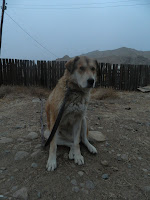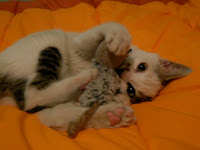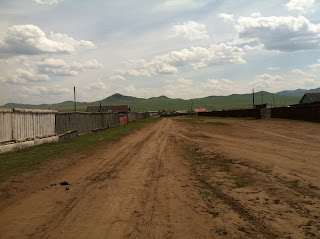In graduate school, I took a class on narratives taught by
the severe and unreadable Barbara Johnstone. She had dedicated her professional
career to the stories people tell and how people tell them in the
linguistically fascinating area in and around Pittsburgh. I learned from her
ways of analyzing discourse and categorizing narrative parts and deriving
conclusions. However, in the stoic analysis of narratives, I was unable to
grasp the depth of their purpose.
Perhaps it's the dry air, the frigid cold, or just the
backbreaking amount of work, but I’ve been frequently accosted by migraines
since arriving at site. During those periods waiting for the meds to kick in
and kick out the pain, I listen to podcasts. Sometimes on my ways to shops, the
library, or my friends’ apartment, I listen to the pleasing voices of
documentary reporters from NPR or the BBC. I’ve been listening to podcasts on
stories and storytelling, and it’s causing me to reflect on my new transient
home.
Since coming to Mongolia, I have learned about this
country’s people and become more acquainted with its history and trajectory. I
worry about the latter. Mongolia is a resource-rich country, but it seems to
lack the one powerful weapon it might have against economic neo-colonialism: a
story.
History was never my forte, I admit. But when I reflect upon
the histories of those countries that were colonized, I recognize one unanimous
strain: the colonized countries that threw off the chains of colonization
quickest, who experienced greatest success afterwards, and who garnered the
most nationalism among their citizens all had some powerful story to give them
identity.
In the 1800, Matthew Perry came to Japan with his black
ships and the small island nation was, after that, bound in chains of unfair
treaties. Japan seemed to recognize immediately a problem, and took steps to
address the conditions that had put it in an inferior position of power
compared to the West. In addition to the Iwakura missions and changes in policy
and government, Japan forged a story for itself: a pure, strong nation with a
leader descended from a goddess and old, native (Shinto) traditions.
Was the story true? Well, not entirely. The myth of the
traditional Shinto wedding, for example, is verily false: it was created in
response to the Christian wedding that had existed for centuries in the western
world. The Japanese made careful decisions about what about their cultural
reality to encourage, enhance, ignore, or destroy (many Buddhist temples, seen
as the manifestation of western—specially Chineses—influence, were destroyed).
However, it was because of Japan’s story and the nationalism that story
engendered that the nation became so powerful.
This also true in many other colonized places and people.
India has formed a unified story that finds its seeds in the character of
Ghandi. Mao helped to create a story for China in the mid twentieth century
(perhaps in a way Chiang Kai-Shek could not). And let us not forget America,
who has one of the most powerful stories, I think: the story of rags to riches
and new opportunities and the possibility for something better if you have the
courage to dream it.
I think Mongolia is still discovering her story. It has one
character well-known but misconstrued and misunderstood, whose history and
story have been forgotten, twisted, and vilified: the character of Chinggis
Khan. Even his name has been warped away from the original, westernized into ‘Genghis
Khan’.
And perhaps part of the reason Mongolia has not yet created
a unified story for itself is because it is still a fledgling out from the nest
of colonization: it was only in the 1980s that the Soviet Union retreated from
this large land-locked nation. I think, too, that unlike many nations who
formed their story while in servitude to distinguish themselves from their
oppressors, Mongolia never had the same exigency: the USSR wasn’t perfect, but
all things considered, it wasn’t that bad. The Russians built schools all over
the country, and when Mongolia wanted independence, the USSR (more or less)
humbly acquiesced. Today, Mongolians seem to feel great affection and
admiration for their old colonial masters.
Now Mongolia is on the cusp of a new, subtler, more nefarious
kind of colonization. I fear that, if not conscious and proactive, Mongolia
will suffer the same fate as many resource-rich African nations—most of which
never found or developed a story strong enough to nationalize their people and give
them the power to distinguish themselves. I hope Mongolia does not suffer the
same fate.
I don’t know what Mongolia’s story will be. And as much as I
wish I could help, Mongolia’s story must be written by her people, for her
people. It is of critical importance, I think, in a way few Mongolians I’ve met
yet realize. After all, I only recently realized the importance of a story—and
that’s after a graduate class studying narratives!
So what is one lowly outsider to do?
For the last few weeks I have been reading fables with my
students: short and sweet stories that carry some thinly veiled moral. My
students have written dialogues of them and performed them. Soon they will
start writing their own stories. Maybe slowly they will go from writing stories
about foxes, rabbits, turtles, and wolves, and go on to write stories about
themselves, about Mongolia, and together create the story that will come to
define this chill and beautiful country.
Until then, all I can do is try to teach. As I do, I wonder
to myself how each face I meet, each challenge I face, and each experience I
have will be spun into the ongoing narrative that will forever come to define
me.
I apologize for including no photos: I will try to do so at a later date.
Cheers,
Karen





































